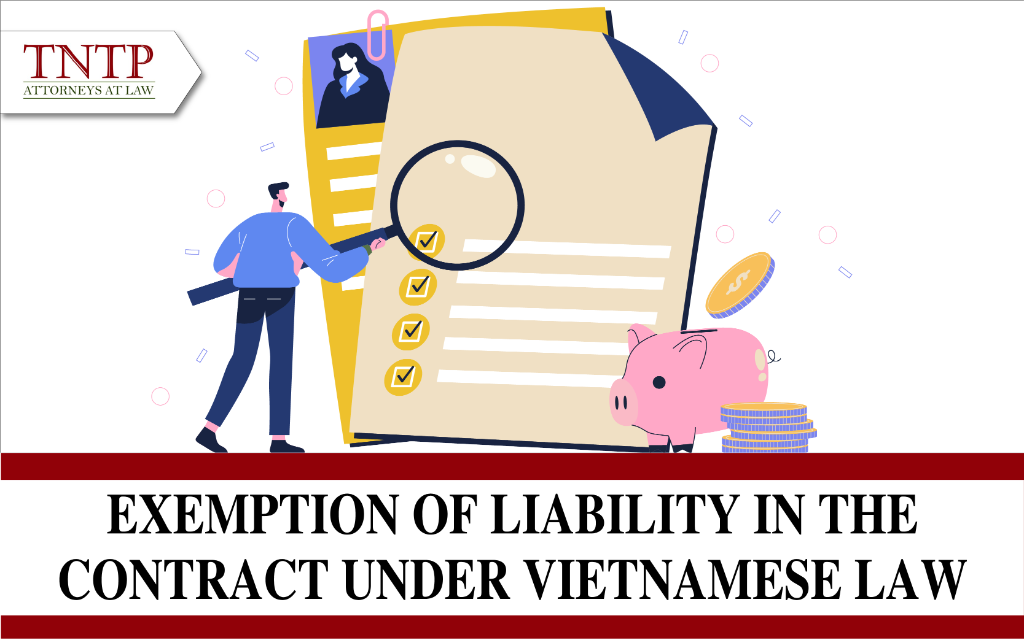Exemption of liability in the contract under Vietnamese Law

During the performance of the contract, the parties may not be able to dutifully fulfill their obligations due to reasons beyond the control of the parties. Therefore, liability exemption is considered a necessary matter for contract law. Accordingly, the parties do not have to bear legal consequences if the breach is not due to the fault of the violating party. In this article, TNTP will introduce to readers cases of liability exemption in contracts according to Vietnamese law.
1. Exemption by the agreement of the parties
This is the case recognized in Point a, Clause 1, Article 294 of the Commercial Law 2005. Accordingly, the parties are not responsible if an event within the parties’ agreement on exemption from liability occurred. The parties can agree on the exclusion of remedies when there is a breach of contract such as penalty, compensation for damages,…
A liability-exempt agreement can be in two forms: First, a total liability-exempt agreement, which means an agreement that allows the parties not to be responsible for all obligations if the exemption event that the parties agreed on happens; Second, an agreement on partial liability exemption. This agreement allows the parties not to be subject to sanctions due to breach of contract within a certain range when a breach of contract occurs.
2. Exemption from liability due to force majeure events
The exemption for liability due to force majeure events is specified in Point b, Clause 1, Article 294 of the Commercial Law 2005 and Clause 2, Article 351 of the Civil Code 2015. Accordingly, the obligatedbreaching party who fails to perform their obligations due to force majeure events are not subject to civil liability, unless otherwise agreed or otherwise provided by law. Pursuant to Clause 1, Article 156 of the Civil Code2015, if a force majeure event occurs that meets the following conditions, the breaching party may be exempted from liability:
• First, the events are objective. An event is considered objective when that event is not created by the parties or arises due to subjective errors of the parties. Some events can be mentioned as natural phenomena: storms, floods, tsunamis…; political and social events: riots, wars…;.
• Second, that event cannot be be foreseeable and is beyond the perceptivity of by the parties. This is understood that when signing a contract, the parties cannot take that event into account during the performance of the contract.
• Third, the consequences of the event cannot be avoidable or cannot be overcome even though the affected party has taken all necessary and permissible measures.
• Fourth, the force majeure event is the direct and sole cause of the breach of contract. Accordingly, only force majeure events that affect the obligation and are the sole cause of the breach of obligation can the violating party be exempt from liability.
3. Exemption from liability due to the other party’s fault
The fact that a party is exempted from liability due to the other party’s fault is stipulated in Point c, Clause 1, Article 294 of the Commercial Law 2005. Clause 3, Article 351 of the Civil Code 2015 also stipulates that the breaching party is exempted if it can be proven that the obligation cannot be performed entirely due to the aggrieved party’s fault.
In essence, both parties commit violations, however, the breaching party’s violation is caused by the fault of the aggrieved party. The conditions for applying the exemption from liability in this case are: First, there must be a fault of the aggrieved party. This error can be an act or no action omission of the aggrieved party and that error must have an impact on the performance of the breaching party’s obligations in the contract. Second, the aggrieved party’s fault must be the sole and direct cause of the breaching party’s inability to fulfill the contract.
4. Exemption from liability due to decisions of state authorities
Exemption from liability due to a decision of a competent authority is stipulated in Clause 4, Article 294 of the Commercial Law 2005. Accordingly, the breaching party is exempt from liability if it can prove that the breach was because of the decision of competent state authorities that the parties cannot know at the time of entering into the contract. That decision may fall into the following cases:
• One party must stop performing its obligations to the other party because it must comply with orders from a state agency for the common benefit of society during the contract implementation process (for example, a decision about social distancing to prevent COVID – 19COVID–19 pandemic);
• One party must comply with administrative orders while the contract is being performed (for example, a competent state agency’s decision to ban the transaction of a certain item).
The breaching party will be exempt from liability if the effects of the above decision fall into one of the following two situations:
• The decision by a competent authority directly affects the subject of the contract, causing the subject of the contract to no longer exist.
• The decision by a competent state agency prevents the parties from fulfilling their obligations in the contract.
Above is the article “Exemption of liability in the contract under Vietnamese Law” that TNTP sends to readers. If there is anything that needs to be discussed, please contact TNTP for answers.
Best regards.



